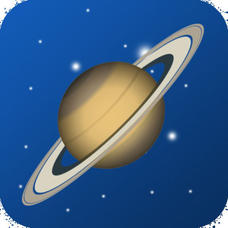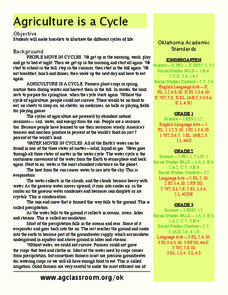Curated OER
Sunrise, Sunset: Quickly Go the Days
Learners explore the concept of daylight. In this daylight lesson, students compare the amount of daylight on a particular day in Anchorage compared with daylight where they live. Learners color maps of the US according to amount of...
Curated OER
DAY AND NIGHT
Students use a lamp as the sun and his/her body as the earth. They rotate in different directions to explain how the earth moves around the sun. Using specific questions in their discussion, students discover the reasons for day and night.
Curated OER
Orbit, rotation, revolution of Earth
Eighth graders define orbit, rotation and revolution. They demonstrate the orbit, rotation and revolution of the Earth. Students identify the types of measurements and the instruments that used for orbit, rotation and revolution. They...
Curated OER
Planet Earth
In this Earth learning exercise, students review the characteristics of the Earth including it's rotation and revolution. This learning exercise has 9 fill in the blank and 7 short answer questions.
Curated OER
The Four Seasons - Earth's Axis
Students discover that it is the tilt of the earth's axis that results in the seasons. They clarify common misconceptions about the earth's orbit around the sun.
T. Smith Publishing
Earth
Young astronomers read an informational text passage and then answer questions based on what they read.
Q Continuum
Planets
Have you ever looked up at the night sky and wondered what constellation you were seeing or whether that bright object was a star or a planet? Are you searching for the best tilt-to-view constellation and planet app that money can't buy?...
Curated OER
Timekeeping by the Sun
Students measure shadows to learn about the Sun-Earth relationship. In this astronomy lesson, students create a shadow stick of a Pokemon character and record measurements of its shadow in a data chart. Follow-up discussions guide...
Curated OER
The Celestial Sphere and Circumpolar Motion
Students investigate the celestial sphere and circumpolar motion. In this science lesson, students view an applet, The Celestial Sphere and Circumpolar Motion. Students discuss the Earth's rotation and stellar movement.
Curated OER
Modeling Day and Night
Students complete a science experiment to study the role of night and day on sleep patterns. In this sleep patterns lesson, students brainstorm about night and day and the causes for the rotations on Earth. Students work in groups to...
Lake Afton Public Observatory
Shadows, Angles, and the Seasons
Shine some light on the topic of seasonal change with this collection of activities. Whether it's by measuring the change in the length of their shadows, or modeling the earth's orbit around the sun using a lamp and a globe, these...
Science 4 Inquiry
Phases of the Moon
The moon takes just over 27 days to orbit around Earth. Young scientists position themselves as the earth as they rotate around the sun and hold the moon. This allows them to observe the patterns and phases of the moon.
Curated OER
Heating the Earth
Middle schoolers explore how the angle of sunlight affects the Earth's temperature and seasons and then apply this understanding to their local situation.
Curated OER
Shadow Trackers: From Photography to Writing
Students explore the rotation of the earth. In this science instructional activity, students view photos of various places around the world. Students conduct an experiment in which they can see how the earth's rotation creates shadows on...
Curated OER
Why Do We Have Night?
Students engage in a fun, creative way to discover how the Earth moves. This lesson helps students explain why there is day and night. It can also create curiosity to further study the solar system and eclipses!
Curated OER
The Planet Earth
Students explore the planet Earth, outer space, and Earth's axis. They demonstrate reading comprehension skills, including literal meaning, inference and critical analysis.
Curated OER
Properties of Earth: Word Search
In this word search worksheet, students search for words related to the Earth, the sun and it's movements. Terms include seasons, features, and movements.
Curated OER
How Big Are Earth, Sun, and Moon?
Third graders draw what they believe is in space on a dry erase board. In groups, they are given a beaker half filled with water and they add a teaspoon of oil, observing the different layers that form. To end the lesson, they identify...
Curated OER
Earth and Seasons
Sixth graders comprehend that the path Earth takes as it revolves around the sun is called its orbit. They also comprehend that the axis is an imaginary line that passes through Earth's center and its North and South Poles. Students...
University of Arizona
The Exotic Vacation
Students explain the concepts and vocabulary of Earth's rotation. They plan imaginary vacations based on the seasons in different locations. This is a very creative lesson plan, which students enjoy.
Curated OER
Agriculture is a Cycle
Students explore cycles in nature. In this cross curriculum agriculture instructional activity, students define "cycle" and research weather and planting folklore. Students make a bracelet in which individual colored beads represent the...
Curated OER
Shadow Trackers
Students use online websites to inquire about the cycle of day and night. In this web based lesson, students are able to see the movement of the sun and Earth. Students can look at different parts of the Earth as if they were on the Sun...
Curated OER
Reasons for the Seasons
Students discover how the Earth's axis of rotation affects the angle of sunlight and the length of day. They take a survey and give the survey out to family members and friends. They tally their findings and then determine the correct...

























